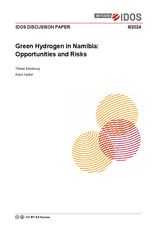Discussion Paper
Green hydrogen in Namibia: opportunities and risks
Altenburg, Tilman / Anne KantelDiscussion Paper (6/2024)
Bonn: German Institute of Development and Sustainability (IDOS)
ISBN: 978-3-96021-231-7
DOI: https://doi.org/10.23661/idp6.2024
Preis: 6 €
Namibia is a highly competitive location for solar and wind energy, which can be utilised to produce green hydrogen and derivatives that are essential for decarbonising the global economy. Its government therefore has high hopes for this entire industrial complex, as do several European countries interested in importing green hydrogen and derivatives from Namibia. This Discussion Paper assesses the related opportunities and risks and offers policy recommendations with a view to maximising the societal benefits for Namibians.
Scaling up renewables projects is a no regret option for Namibia, as there is demand for domestic electrification, clean electricity could be exported to South Africa, and using renewable to produce hydrogen and derivatives for export offers prospects for foreign exchange earnings and economic growth. Here, the most immediate opportunities lie in exporting green ammonia, yet other market opportunities may open up, including the export of sustainable aviation fuel, hot-briquetted iron and green fertiliser. At the same time, international investors are hesitant to implement their planned investments due to uncertainties regarding international offtake agreements and other risk factors, e.g. relating to shipping capacities and financial guarantees. This calls for a gradual scaling-up of hydrogen and ammonia investments, accompanied by continuous technology and market foresight, and carefully designed risk-sharing agreements with international investors.
Hydrogen investments come with political and environmental risks. Politically, the sheer size of the planned projects creates incentives for socially exclusive rent-seeking deals. Unless strict transparency rules are applied, directly partaking in deals with large investors may create opportunities for legal or extra-legal enrichment. Hence, it is essential to have full transparency for tenders and contracts. Even if all deals were fully transparent, this would not guarantee widespread benefits for the Namibian people. We predict fewer employment and other socio-economic spillovers than anticipated in the country’s current strategy. Also, projects may be less profitable than expected, and information asymmetries between large investors and Namibian policy-makers may translate into unfavourable risk- and benefit-sharing agreements. To ensure widely shared benefits, options for a pro-poor use of revenues from hydrogen projects should be explored to achieve socio-economic spillovers from financial investments in green hydrogen. These include direct dividend payments to citizens, earmarking of public revenues for development funds, mandatory oversizing of electricity generation and desalination to serve local communities, and co-ownership of energy projects.
Kontakt
Cornelia Hornschild
Koordinatorin Publikationen
E-Mail Cornelia.Hornschild@idos-research.de
Telefon +49 (0)228 94927-135
Fax +49 (0)228 94927-130
Alexandra Fante
Bibliothekarin/Open Access-Koordinatorin
E-Mail Alexandra.Fante@idos-research.de
Telefon +49 (0)228 94927-321
Fax +49 (0)228 94927-130




